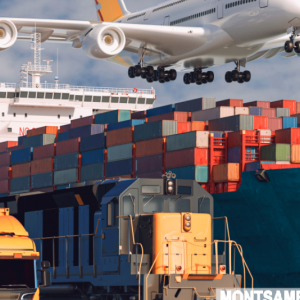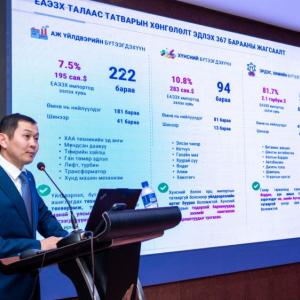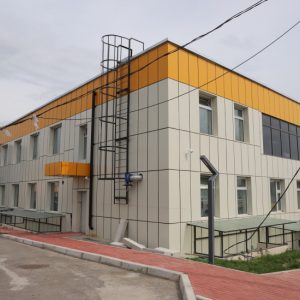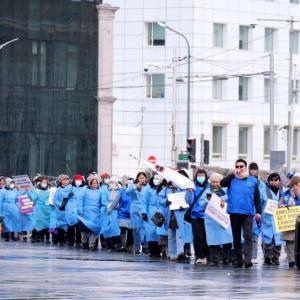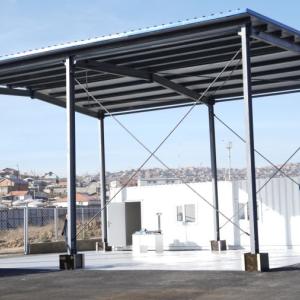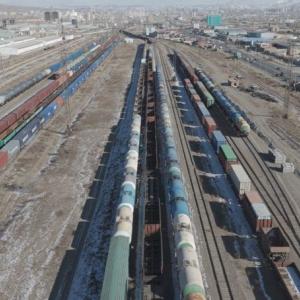Economy of Mongolia in 2020: Impact of coronavirus and other risks
The Mongol Messenger
This article was written in March for the latest issue of the Mongolia Today quarterly magazine.
Ulaanbaatar /MONTSAME/. In addition to the world facing economic difficulties as a result of the coronavirus pandemic, there have been alarming news articles about a possible serious recession on the way that have yet to occur in the last 100 years.
With the coronavirus infection becoming a new challenge for the global economy, the situation drastically changed from late January 2020, with less and less hopes of the economy quickly recovering with each passing day… To prevent a possible deep plunge, policymakers around the world are taking immediate measures, and as of mid-March, over 30 central banks have come to the decision to lower their policy rates. One of those central banks is the Bank of Mongolia, which lowered its policy rate by 1.0 percentage point, and the reserve requirement at banks by 2.0 percentage point.
As the COVID-19 infection is spreading rapidly, it is currently difficult to determine its full impact. However, we can see that the coronavirus has already begun to affect the economy of Mongolia from the data provided by the National Statistical Office. In order to elaborate on the matter, let’s take a few economic indicators that are able to show us the reality of the current state.
The economic performance in the first two months of 2020 presents that the general government budget revenue amounted to MNT 1,464.4 billion, which is a decrease of MNT 173.7 billion or 10.6 percent compared to the same period of the previous year. As a result of export decreasing by 29.5 percent, the revenue of the mineral industry which brings 23.7 percent of the general budget revenue became MNT 347.3 billion, decreased by 32.9 percent compared to 2019. Alongside the decrease in export, the amount of import also decreased by 10.4 percent. This is a result of the abrupt drop in demand for commodities in China due to the coronavirus, with more specifically, the usage of coal decreasing by 30 percent.

One of the unique aspects of Mongolia is that the national GDP equals foreign turnover, which is determined by both export and import, whereas the total amount of export and import of other countries is 2.5 to 3 times less than their GDP. In other words, as Mongolia is too reliant on import-export, the aforementioned statistics show that budget revenue has a direct dependence on export of mining commodities and products. To put in numbers, mining products make 87.1 percent of the total export revenue.
Sensitive sectors
Sectors that immediately received the worst impact from coronavirus are the air transport industry and the tourism sector. The World Travel and Tourism Council has also warned that the coronavirus epidemic was putting up to 50 million jobs in the global travel and tourism sector at risk, with travel likely to slump by a quarter this year.
As the tourism sectors of countries that were previously affected by virus infections such as SARS, H1N1, and ebola required an average of 19-20 months to recover, it seems that the coronavirus spread will have a negative impact on the sector for a long period of time. Despite taking a relatively small percentage (5-6 percent) of the GDP, our tourism sector that creates a large amount of job opportunities (about 60 thousand) has already begun to show preliminary signs of crisis. The number of foreign travelers that arrived in Mongolia in February 2020 has decreased by 21 percent compared to the same period of the previous year, with tourism income dropping by 28 percent.

Blue Pearl Ice Festival - the large-scale annual winter tourism event that takes place at Lake Khuvsgul in Khuvsgul aimag was cancelled. One of the main events that attracts tourists in March, the Eagle Festival was also cancelled this year. Just like so, the main tourism events during the winter were all cancelled due to the global spread of the coronavirus. As a result, the income of the air transportation industry in the first two months of 2020 decreased by 21.7 percent.
Government’s estimation and measures being implemented
The economic indicators of Mongolia began to improve from late 2016. More specifically, while the economy grew by 5.3 percent in 2017, it increased to 7.2 percent in 2018. As for 2019, the economic growth slowed down due to the export of the mining sector, bringing it down to 5.1 percent. Based on the indicators of the last months of 2019, the World Bank estimated the economy of Mongolia to grow by 5.6 percent in 2020, while the Asian Development Bank estimated the growth to be 6.1 percent. However, due to the coronavirus outbreak, the stable, growing economy has been put to a halt. According to the calculations made by the Ministry of Finance, the GDP is expected to decrease by about 1 percent at the current state. In comparison, the growth of the national GDP in 2008 that was at 8.9 percent reduced to 1.6 percent in 2009 during the recession.
Despite the situation, Minister of Finance Ch.Khurelbaatar said with confidence that the Government of Prime Minister U.Khurelsukh can overcome the difficulties of one year by keeping consistent with the economic indicators of previous years. According to the minister, the time and income that was lost can be recovered once the outbreak ends and export is restored back to normal. For a country like Mongolia with a relatively small economic capacity, it is possible for the economy to be regained if export is restored. Moreover, the Chinese side has also expressed that the maximum amount of commodities that can be produced by Mongolia will be purchased.
There are numerous economists that consider that a budget amendment should be made based on their conclusion that the situation is getting worse. However, Minister Ch.Khurelbaatar expressed that the Government and the Ministry of Finance are set on “not making a budget amendment, and completing all works that have been planned with investment from the state budget.”
During the coronavirus pandemic, countries of the world are taking three main measures for their economy. Firstly, to increase the financing and investment in the health sector. Secondly, to support entities with a tax policy. And thirdly, to support business owners with a monetary policy. On this matter, the Government of Mongolia is also taking certain step-by-step measures, highlighted Minister of Finance Ch.Khurelbaatar. To not have consumer goods shortage and price gouging, the supply chain is being operated as normally, and prices are stable as a result of certain measures that were prioritized to exempt the products from customs and delay VAT payments.
On the other hand, as private entities are having difficulties in making social insurance payments, they have been exempt from payments from April 1 to October 1. The previous decision to not place fines for unpaid taxes during the period has also served as a largely significant support for entities.
Foreign exchange reserves
The current foreign exchange reserves of USD 4.3 billion is an amount that can provide for 9 months of import needs as well as keep the exchange rate stable and limit the increase in import product prices, highlighted Director of Economic Analysis and Policy Division at the Monetary Policy Department of the Bank of Mongolia B.Tumentsengel.
Moreover, during the period the border was closed in February 2020, the central bank purchased 952.6 kg gold from entities, which was 10 times more than the same period in the previous year (In February 2019, the Bank of Mongolia purchased 95.9 kg gold from entities), underlined economist J.Batsuuri.
At this speed, the foreign exchange reserves are expected to increase by 25 tons of gold or USD 1.2 billion (without including the income of other foreign exchange) by the end of the year. On top of that, as the price of petroleum has dropped to an amount that is nearly 2.5 times less than its previous price on the global market, there will be less foreign exchange used to purchase petroleum, which is the main import product for Mongolia. Nonetheless, the likelihood for foreign exchange rate to decrease is very low as there are quite big foreign payments to be made in the coming years.
Risks
Risk continues to grow for the economic prospect due to uncertainties in foreign and domestic environments this year, warns the World Bank. In other words, the economic prospect is highly dependent on the political uncertainty due to factors such as the upcoming election, the downwards trend for commodity prices, the reform process in the banking sector (recapitalization of banks), and advancements in operations to combat money laundering. Regarding the risk of the election year for instance, policymakers might begin to show not much concern about the step-by-step measures for reforms that have been implemented in the last few years and seeing the results.

As for the second risk directly correlated with the coronavirus--Fitch Solutions lowering their forecast for China’s economic growth in 2020 from 5.9 percent to 4.2 percent is clearly due to the coronavirus pandemic. Being the result of the slowdown in growth, it is highly likely for the amount of mining commodities purchased from Mongolia to decrease considering that there would be a lower demand in China in 2020. While the price of coal - the main export commodity has been relatively stable, copper prices plunged from USD 6,300 to USD 4,700. Due to factors such as the recovery of the US economy, halt in the trade war between Beijing and Washington, advancements in the Brexit process as well as low amount of copper being kept, copper price had grown sharply earlier in the year, reaching USD 6,314 per ton. If copper price continue to drop below USD 4,500, Erdenet Mining Corporation will begin to have a deficit. As the copper industry provides 40 percent of export income, and about 15 percent of the budget income of Mongolia, there is a risk of lower economic activity due to less export income if the situation persists.

Furthermore, the price of iron ore - another core export product of Mongolia is also likely to drop. In 2019, Mongolia exported 8.4 million tons of iron ore for USD 576.6 million. The National Statistical Office mentioned that exports have grown by 13.4 percent in amount, and 68.5 percent in value. From this, we can see that iron ore export has a larger capacity for income generation compared to the cashmere industry. However, as the demand in China is likely to drop, and the market supply to grow, its price that was at USD 119 per ton is expected to decrease to USD 80 in 2020. Thus, the World Bank came to the conclusion that during the current state of high dependence of the economy of Mongolia on the economy of China, the impact of the novel coronavirus on the Chinese economy will also negatively affect the Mongolian economy.
Moreover, according to the bank’s report on the economy of Mongolia that was published in February 2020, the economy growth has slightly slowed down in speed compared to the previous three years, but continues to stay positive in the mid-term economic forecast.
B.Adiyakhuu
 Ulaanbaatar
Ulaanbaatar

















